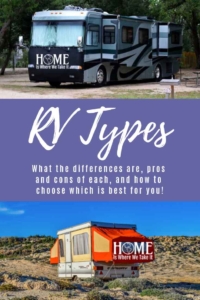 If you’re looking for an RV, you’re probably confused and baffled about RV types…I gotcha covered…been there, done that! From little tiny baby campers to full on big daddy campers, let’s take a look at what all the different types are and what are the varying factors for each.
If you’re looking for an RV, you’re probably confused and baffled about RV types…I gotcha covered…been there, done that! From little tiny baby campers to full on big daddy campers, let’s take a look at what all the different types are and what are the varying factors for each.
You wouldn’t think there’s so much to consider when shopping for an RV, but there definitely is! You can check out my other post about things to consider when buying an RV here.
I like to think of RV types as three different categories (but I’m sure there are other opinions).
- Motorized (Class A, B, & C)
- Pull-behind (5th Wheels, Travel Trailers, Pop-ups, etc.)
- Everything else (Skoolies, Tiny Houses, etc.)
I’d also like to mention that most of these RV types can come in bunkhouse floorplans (bunkhouses just stack beds for multiple campers).
By way of warning, this is a LONG post…skip ahead to the part you’re most interested in if you’d like!
*Affiliate links are not uncommon in my posts. If you click one and make a purchase, it will cost you no extra money but will allow me to make a few extra dollars to help run this blog. Thanks!
CLASS A MOTORHOMES
Let’s just get the big daddy out of the way! When it comes to ultimate comfort in RV types, it doesn’t get much better than Class A Motorhomes!
Class A motorhomes are the bus-like, driveable glampers. They can be anywhere from about 26-45′ in length and generally 8.5′ in width and an average of 10′ in height. Slideouts are common in most modern Class A motorhomes, but not necessarily a given.
These motorhomes can be either diesel or gasoline engines and have the capacity to tow a vehicle behind (often referred to as a toad).
Brand new Class As can cost anywhere from $50k all the way up to over $3 million (if you don’t believe me, check out this post!). They are generally the most expensive, but also the most spacious and have the most amenities.
Things to think about with Class A’s: size of the RV (some campgrounds have size limits…especially national parks), gas mileage/gas prices (often an unseen cost), tow capacity, storage capacity, higher personal property taxes, and insurance rates, and special licensing (in certain states…check out this helpful post).
CLASS C MOTORHOMES
I prefer to group Class C’s with Class A’s when I’m talking about drivable RV types. I’ll get back to Class B’s…pinky promise! If Class A’s are buses, then you can think of Class C’s as the short buses…without the bad jokes!
Class B motorhomes are generally between 20-30′ long (but can go up to 40′ or so), also with an average of 10′ height and 8.5′ wide. These also come in gasoline and diesel engine and can also tow a vehicle behind. Class B’s also have the added benefit of another bed over the cockpit.
Many people choose to purchase Class C’s over Class A’s due to maneuverability when driving and ease of getting in and out of tight spots. They are also generally less expensive. Prices can range from $40k-$150k or so.
Things to think about with Class C’s: much more maneuverable than Class A’s, but also smaller interior, better gas mileage than larger motorhomes, considerably smaller tow capacity and storage space. Insurance will still be more than a pull-behind, but likely less than a Class A (call your agent to verify that though). Also, check the link above for special licensing (usually has to do with weight).
CLASS B MOTORHOMES
See…that wasn’t too long of a wait, was it?
If Class A & C motorhomes are busses, then Class B campers are more like courier vans…they are usually large, custom conversion vans built on a truck chassis.
Class B’s normally range from 20′-31′ in length and are generally about 7-9′ tall and cost anywhere from $40k-$80k. They also have both diesel and gasoline engines.
Benefits of Class B RVs are: they can go anywhere a car can go, they are often used for stealth camping. Storage space is…well…what’s that? They CAN have bathrooms and showers but often don’t. This isn’t a concern if you’re camping in a campground. Life is best lived outdoors when you have a Class B.
Things to think about for Class B campers: MUCH better gas mileage that Class A & B, are generally cheaper, much more maneuverable, easy to park, CONSIDERABLY less tow capacity if you want a toad. No special license needed.
GAS VS. DIESEL
I don’t want to harp on this forever, but I would like to point out a couple of things…all of these things are true of drivable RV types and tow vehicles.
While it’s true that gasoline is less expensive by the gallon, generally speaking, diesel engines get better mileage. They also have a longer life…by like, A LOT! (Like that scientifically proven data there…it is a real thing…I promise!)
However, diesel isn’t always easy to find. With a great app like GasBuddy, this shouldn’t be a problem though.
Diesel engines require special attention in cold weather. They are also SUPER LOUD compared to gas engines.
One last diesel RVs are usually more expensive to purchase and maintain, but also hold their value better in the long run.
I found a great article from Gone With The Wynn’s about the whole subject. It’s certainly more in-depth than this one!
TOWABLE CAMPERS
There are a few things to think about when considering towable RV types.
- Outfitting the tow vehicle
- Installing tow package
- Stabilization bars or chains
- Installing an optional tire pressure monitoring system
- Installing or upgrading backup cameras
- Tow capacity and tongue weight
- Gas mileage (my Pathfinder gets about half the gas mileage with a 21′ camper behind it)
There are added costs and concerns with towables, but you will still have these costs if you pull a toad with any of the driveable motorhomes.
Another thing to think about is that if you choose a motorhome, your home goes in the shop if it breaks down. With a towable, if your vehicle breaks down, you can set up camp and enjoy the stay! 🙂
5TH WHEEL CAMPERS
When you’re thinking about towable RV types, 5th wheel campers are the biggest, baddest dudes out there. They range from about 27′ to about 45′ long. Average cost is about $25k-$65k.
Pros of 5th wheels:
- Towing vehicle is freed up after detaching camper
- Multi-levels (often has an “upstairs” bedroom or den)
- High ceilings (some even have ceiling fans)
- Easier towing (less sway on the road)
- Easier parking
- More storage underneath
- More luxurious
- Can tow behind the camper
- More spacious
- Can have a drop down porch
Cons of 5th wheels:
- More expensive
- Higher roof – riskier when towing (may need special GPS)
- Higher roof – more drag when driving, worse gas mileage
- Heavier
- Tow receiver takes up room in a truck bed
TRAVEL TRAILERS
This is a tricky subject because travel trailers can range anywhere from tiny little 13′ Scamp campers to 40+ feet massive campers. Let’s just say we’re talking about a 32′ travel trailer with a bathroom…how about that? Seems average enough. Average cost is between $15k-$40k.
Pros of Travel Trailers:
- Drivable towing vehicle
- Often MUCH less expensive than other RV types
- Insurance is considerably less on TTs
- More comfortable than a tent! 🙂
- Less expensive than 5th wheels or motorhomes
- Lighter than 5th wheels
Cons of Travel Trailers:
- Often have shorter financing terms
- Produce more sway on the road
- Parking is more difficult
- Not as much storage as 5th wheels or motorhomes
TOY HAULERS
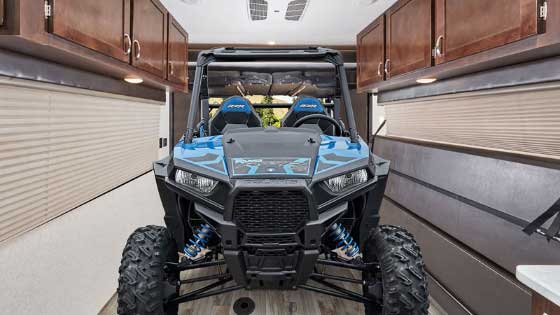
Image from this website.
Here we go! Here is some fun stuff here…TOY HAULERS ARE IN THE HOUSE! I LOVE the idea of toy haulers!
I waited to talk about them because toy haulers can be either a 5th wheel or travel trailers.
Toy haulers have pretty much the same features as either of their counterparts, but also have a “garage” area for storing toys such as golf carts, motorcycles, ATVs, or small, teeny tiny little baby cars. They can cost anywhere from $15k-$80k and more.
Often, these RV types have a drop down bed over the garage area for sleeping after the vehicle has been moved.
They are usually REALLY long though. This can be a disadvantage when choosing RV parks.
Pros and cons are the same as 5th wheels and travel trailers. The only exception would be the tow weight if you have it fully loaded. This will SEVERELY limit which tow vehicle you can use.
POPUP CAMPERS
These fun little RV types have a special place in my heart! We had a VERY old popup when our kids were little and I have SUPER fond memories camping in it!
Popup campers fold down on themselves to store away in one neat little compact camper. They can cost anywhere from about $8k-$20k depending on features.
Pros of popups
- Lightweight (can be towed by a sturdy car)
- More room than a tent
- Usually has a kitchen on board
- Built-in beds and dining room
- Minimal storage (makes for an easier turn around for serial campers)
- Usually comes with air conditioner
Cons of popups
- Not very spacious
- Usually no bathroom or showers on board
- The tent can become molded or damaged
- Often cumbersome to setup
- Difficult to maintain a steady temperature
If money is tight, these can be a great solution to enter the camping lifestyle. We took our little guy all over the south including our normal spots in central Arkansas, down to Florida, and even to North Carolina! I think we bought ours used for about $1,000.
TRUCK CAMPERS
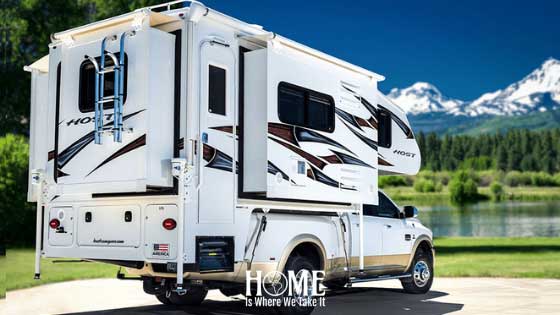
Image from this website.
Truck campers are all of the fun, none of the hassle! If you have a truck already, then you’re good to go.
These things actually come with slideout options, who knew?!
They are also considerably cheaper than their big brother models. Average prices come in around $20k-$50k (for the larger, nicer ones with slideouts).
Pros of Truck Campers
- Take it anywhere a car can go (except for low ceiling garages)
- Makes for great boondocking
- Can be cozy
- Removable…leaves your truck free to be your daily driver
- Cheaper insurance compared to other RV types
Cons of Truck Campers
- Not great for off-roading
- Height can be a concern under bridges (bigger ones are around 12′ tall)
- Heavy (acts like a sail in heavy winds)
- Small compared to travel trailers, 5th wheels, or motorhomes
OTHER RV TYPES
Some people just HAVE to be different! 🙂 Just kidding. I currently have two adult children considering skoolies.
SKOOLIES
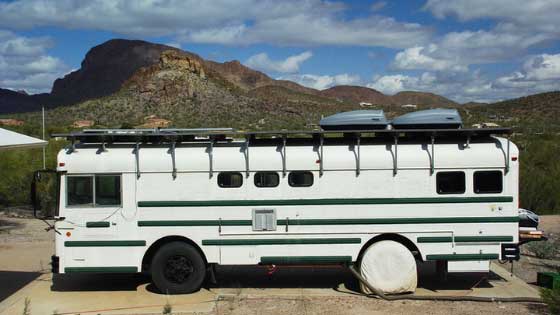
Image from this post.
Skoolies – school buses converted into RVs. These are still fairly new concepts (not really, but just catching on), so I’m not even going to venture to find costs for skoolies. Obvious pros are that you can find an old school bus that has finished it’s active duty, but still has life left in it.
They often have diesel engines which last forever. You can often find them at auctions for ABSOLUTE STEAL pricing.
People have made whole YouTube careers off of gutting and outfitting skoolies, but even if you don’t do the renovation yourself, they are still cheaper to buy overall than other RV types.
TINY HOUSES
Tiny Houses – Small, cleverly crafted homes on trailer frames (I know they’re not all on frames, but the ones I’m talking about are…mkay?). Alright!
I have a cousin currently traveling the country with one of these. They have all of the luxuries of home…just with less square feet.
They can be heavy. Often, RV parks are funny about letting them in. Curiosity draws A LOT of attention, so chatty people will burn up your relaxation time with conversations about your home. Prices can be WILDLY different depending on features.
However, they can be fun and really feel like a real home.
When I asked my cousin why tiny house over an RV, she said it was the quaint feeling and the cost. She was able to get a used one for around $30k if I remember right. What a deal!
TEARDROP CAMPERS
Teardrop Campers – little bitty baby campers that are basically a bed on wheels.
Now technically, these should be in the travel trailer category, but to me, they just don’t fit.
As defined by Webster’s Dictionary a travel trailer is “a trailer drawn especially by an automobile and equipped for use (as while traveling) as a dwelling.”
I guess by definition they are travel trailers.
At any rate, there are fancy ones that have kitchens on the back side, but none that have a potty and water on board. However, if all you had was a small car or a large motorcycle, you could still pull one of these because they are so lightweight.
They are often as expensive as regular travel trailers. I have yet to figure that one out, but ok…whatever. They can get on upwards of $25k for the really fancy ones, but cheap ones are around $5k brand new.
They are extremely light and can get in and out of tricky places. I would think this would be a great option for a single person, a young couple, or someone that just didn’t care about having a lot of space…like an outdoorsy person.
I could see owning one of these for if Glynn didn’t want to go camping. It would be easy to just hook it up and go…but I do like showering in my own bathroom, so I dunno…I’d have to try it out!
WHICH RV TYPES ARE FOR YOU?
On THAT note, it’s a great time to mention trying out your chosen camper BEFORE buying.
There is a great website called RVshare.com. What RVshare.com does is that it links up someone wanting to rent an RV to try it with someone who owns the RV and wants to allow it to be rented.
This is a FANTASTIC way to try before you buy! If you rent a Class A motorhome and HATE it, then you know not to buy one. Conversely, if you rent a popup camper and LOVE it, then you know which one to get!
What if you want to try a 5th wheel, but don’t have a tow package? You can arrange drop off and pick up with the owner. They will often be willing to bring it to you if you ask. Here’s a great article about that.
Well…that’s it in a nutshell! It’s by no means comprehensive, but it’s a good start. Have you been shopping for an RV? If so, what kind are you leaning towards and why? I’d love to hear from you in the comments!
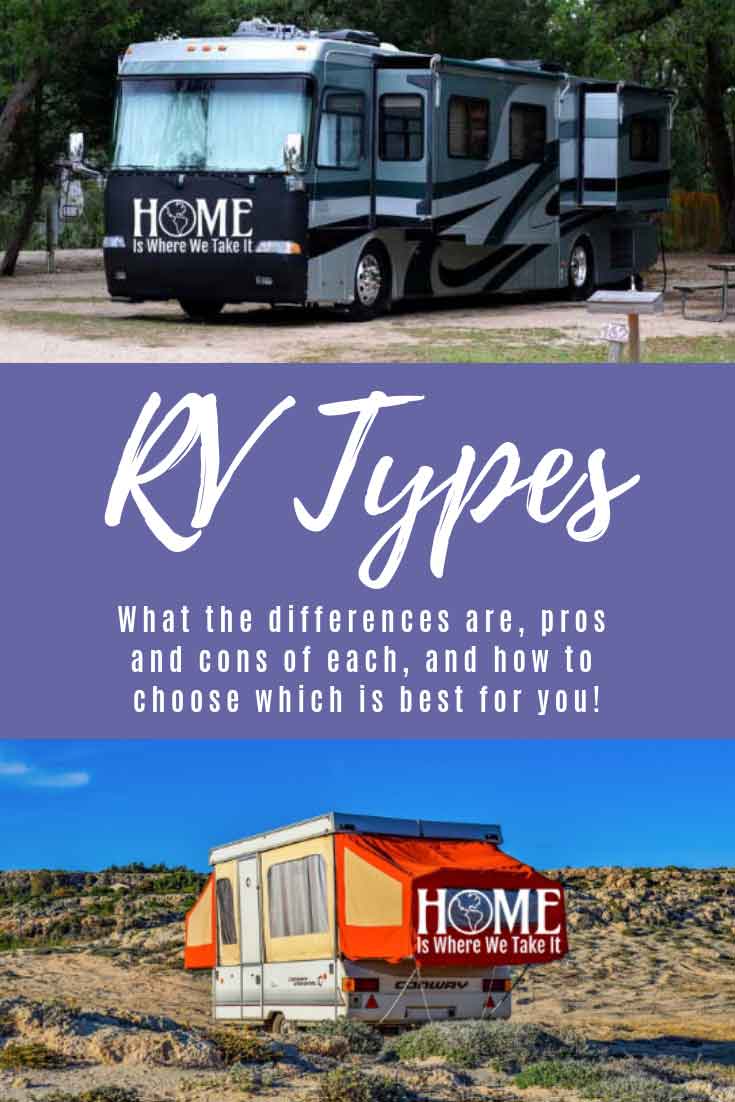

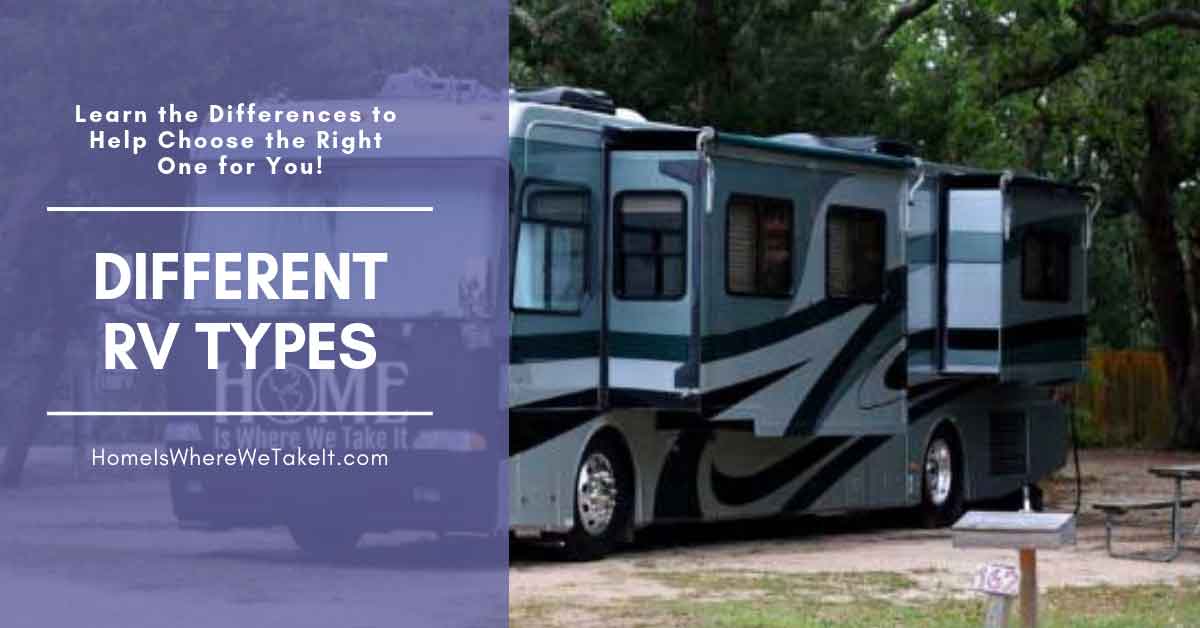



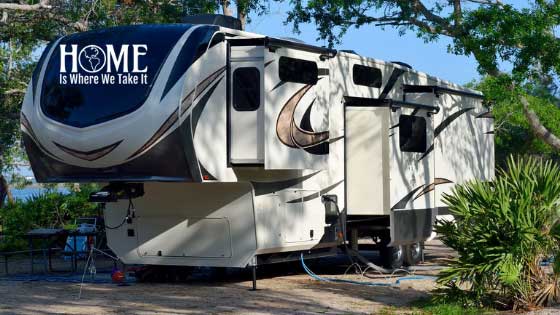

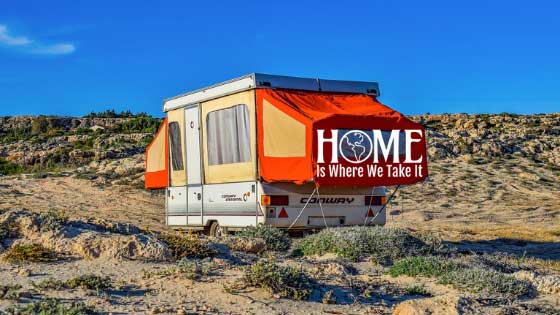

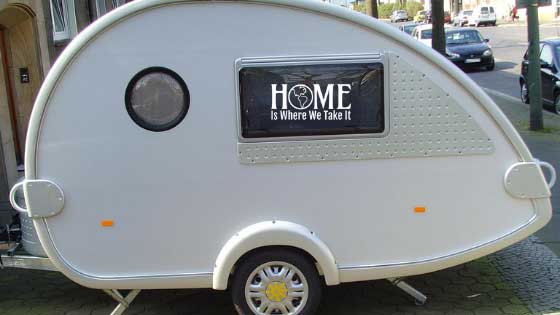
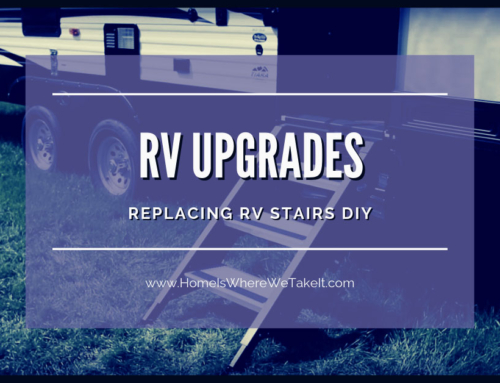
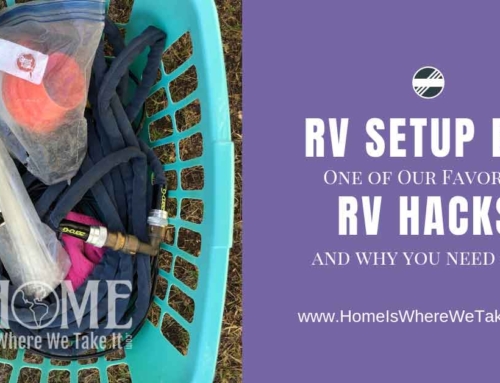
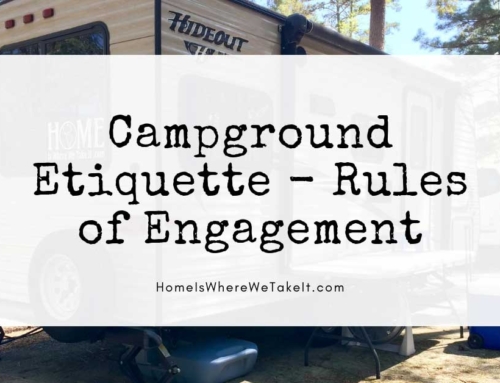
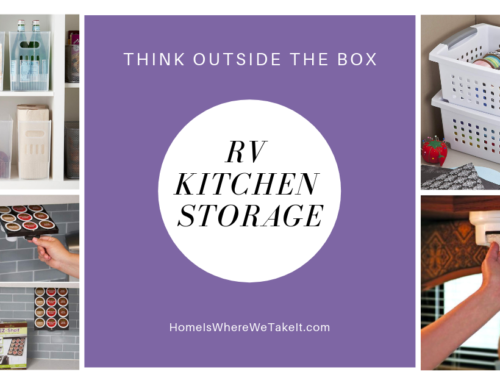
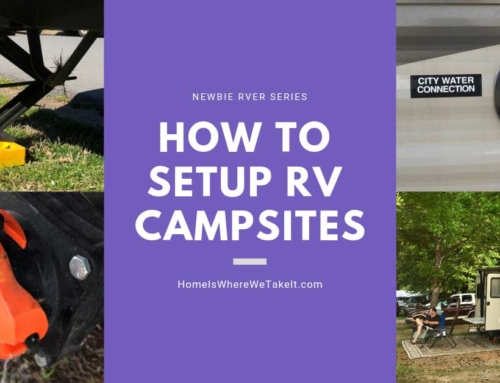
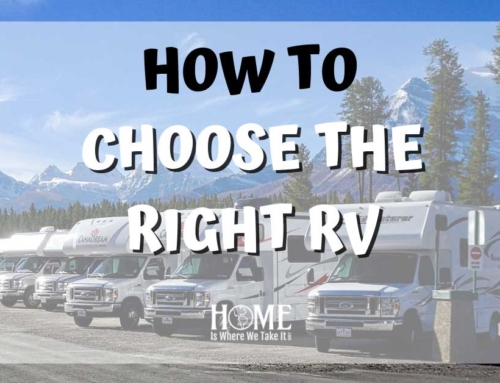
[…] one for you? I mean, you can do all the research on what to consider when buying RVs and all the different types of RVs, but at some point, you’ll have to bite the bullet and buy […]